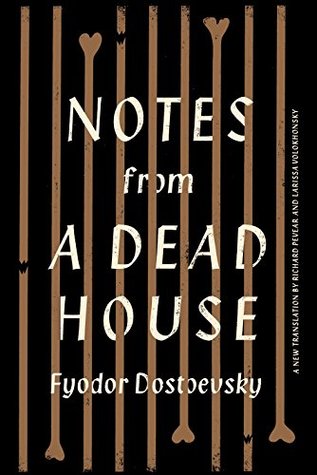More on this book
Community
Kindle Notes & Highlights
Read between
April 20 - April 26, 2024
a prisoner passionately loves money and values it above everything, almost on a par with freedom, and that it is enough to have it jingling in his pocket for him to be comforted.
This does sound frighfully like life. Let me have an analysis here. I said earlier that Dostoyevsky believed prison to be a sort of anti-life, but this perfectly desccribes many of us in freedom. That is the significance of this alive dead house; each man builds himself an anti-life within his life.
A battle in many Dostoyevsky works is a search for the living life.
in many ways the prisoners were perfect children.
One killed as a vagrant beset by a whole regiment of pursuers, defending his freedom, his life, often dying of hunger; another cuts little children’s throats for the pleasure of it, to feel their warm blood on his hands, to enjoy their fear, their last dove-like trembling under his knife. And what then? They both go to the same hard labor.
a living man cannot be made into a corpse: he will be left with his feelings, with a thirst for revenge and life, with passions and the need to satisfy them.
Prison fails because it tries its beest to contradict the living of men. Goryanchikov already wrote about that in chapter one and it was Dostoyevsky's critique on the penal system.
Every convict, however bold and impudent he may be, is afraid of everything at hard labor. A prisoner awaiting judgment is another matter.
I'm not gonna go into lengthy dissections of quotes anymore now tha I've pointed out the main themes, motifs, and symbols. I will discuss everything new but fo developmets, I will just highlight.
But he was precisely counting on putting off the terrible moment of punishment for at least a few days, a few hours! He was such a coward that, in attacking the officer with a knife, he did not even wound him, but did it all for the sake of form, only so that there would be a new crime, for which he would again stand trial.
(I know I'm undermining my last note, but...)
Dostoyevsky is just so good in portraying this. It shows especially in the thematic battle of Rodya vs Porfy in CNP. It is that inclintion to draw out the agony of the crime, if only to stall the punishment by the slightest moments.
The flesh had won out over all his inner qualities so much that from the first glance you could see by his face that the only thing left in him was one savage craving for physical gratification, sensuality, fleshly indulgence.
God will reward you, and I will never forget you
But who knows? Maybe many years from now I’ll be sorry when I have to leave it!…,” I would add, not without an admixture of that gleeful feeling which sometimes reaches the point of a need to deliberately chafe your own wound, as if you wish to admire your own pain, as if the consciousness of the extent of your misfortune indeed affords pleasure. The
amidst the hostile I had as yet to divine the comforting.
Otherwise they’ll chew you to pieces. Beat you to death, maybe, or simply kill you, or at least scare the hell out of you.
Off topic but i TRIED to read a coontemporary mafia romance and got one (1) chapter done before i decided to stop wasting my time. And a great difference is that in everthing dark and vile, Dostoyevsky says it plainy while the book terribly romanticised it. I am talking about Kincaid's Dante.
“A convict is a convict; if you’re a convict, you can act meanly and not be ashamed of it.”
This was discussed in TBK. It was given as a reson for why the Church should be the state and take over even the penal system: if a man is convicted he is not just fettered by the law but by the repreesntative of Hevean itself; all crime is against the Church. Therefore there is much more weight on a sentence yet giving more space for genuine repentance.
The whole meaning of the word “prisoner” is a man with no will; but in wasting money, he is acting by his own will.
And what will one not give for freedom? What millionaire, his throat squeezed by a noose, would not give all his millions for one breath of air?
So, perhaps, a man buried alive wakes up in his coffin, bangs on the lid and tries to throw it off, though of course reason could convince him that all his efforts will be in vain. But the point is that he is no longer reasoning: it’s convulsions.
“How many thousands of days like this lie ahead of me,” I thought, “all the same, all just the same!”


